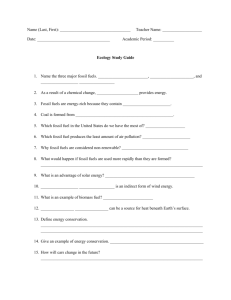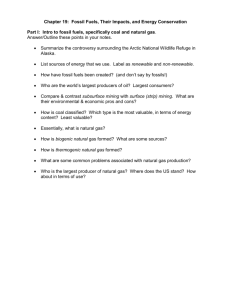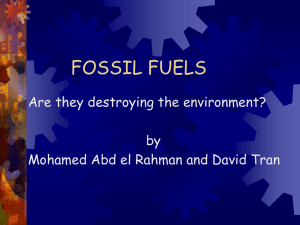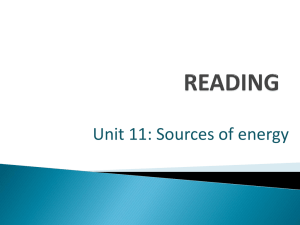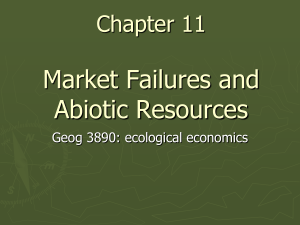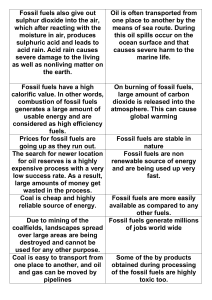Garlock Chris Garlock Dr. Marx Focused Inquiry 112 4/10/15 The
advertisement
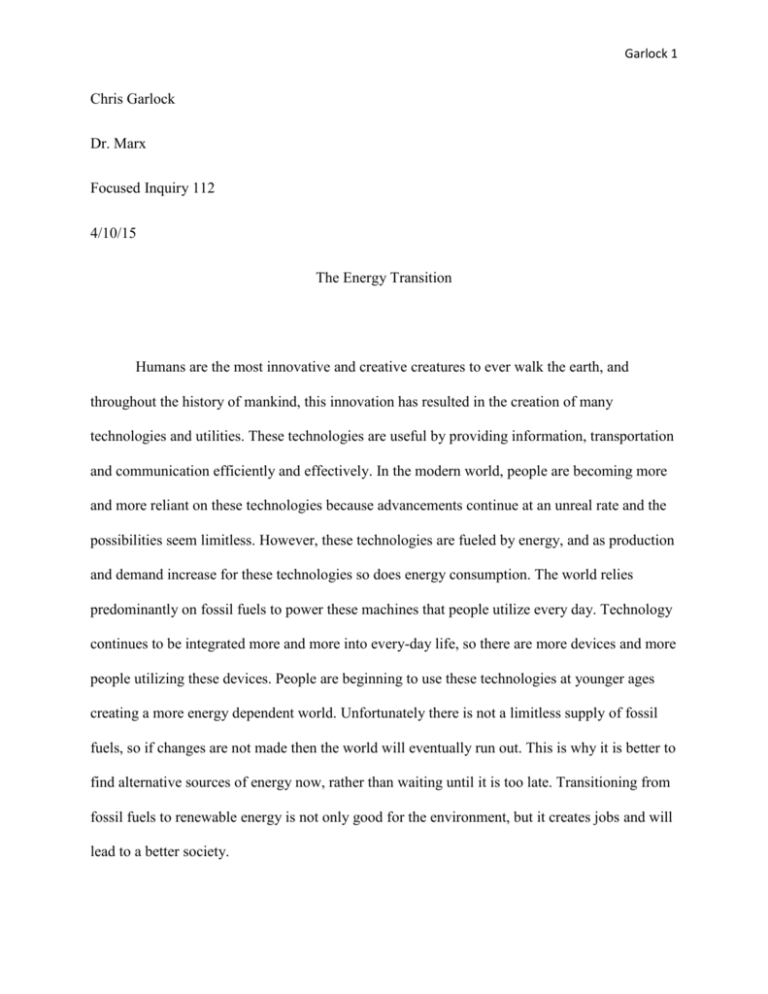
Garlock 1 Chris Garlock Dr. Marx Focused Inquiry 112 4/10/15 The Energy Transition Humans are the most innovative and creative creatures to ever walk the earth, and throughout the history of mankind, this innovation has resulted in the creation of many technologies and utilities. These technologies are useful by providing information, transportation and communication efficiently and effectively. In the modern world, people are becoming more and more reliant on these technologies because advancements continue at an unreal rate and the possibilities seem limitless. However, these technologies are fueled by energy, and as production and demand increase for these technologies so does energy consumption. The world relies predominantly on fossil fuels to power these machines that people utilize every day. Technology continues to be integrated more and more into every-day life, so there are more devices and more people utilizing these devices. People are beginning to use these technologies at younger ages creating a more energy dependent world. Unfortunately there is not a limitless supply of fossil fuels, so if changes are not made then the world will eventually run out. This is why it is better to find alternative sources of energy now, rather than waiting until it is too late. Transitioning from fossil fuels to renewable energy is not only good for the environment, but it creates jobs and will lead to a better society. Garlock 2 Fossil fuels are “found in the Earth’s crust and created from the remains of plants and animals that lived millions of years ago in the form of concentrated biomass)” (ier), and are what power the world. Although fossil fuels are a reliable source of energy, there is no guarantee that that they will be around forever. Global reports show that in 2011 alone, total energy production around the world was 518.546 BTU’s whereas consumption was 520.272 BTU’s (eia). This means that in the year 2011, humans were using energy resources at an unsustainable rate, depleting the supply of energy available. If energy were to be consumed at an unsustainable rate, the world would eventually deplete its natural resources, which could result in loss of power/fuel and crisis everywhere. Fortunately laws and regulations are in place in order to prevent or at least delay this from happening. However, consumption and depletion are just a portion of the problem. The fossil fuels the world mainly relies on are; coal, oil and natural gas, unfortunately these fossil fuels have numerous environmental impacts. One of the many effects overuse of fossil fuels has on the environment is pollution; which occurs when the “burning of fossil fuels releases carbon dioxide, nitrogen monoxide, nitrogen dioxide, sulphur dioxide, carbon monoxide etc.” (Kukreja). This not only affects the environment, but human health as well. This is an issue throughout the world and will only increase as fossil fuels continue to be consumed. Examples of this include climate change, air pollution, and oil spills (Fanchi).Another hazard fossil fuels produce is acid rain. Acid rain occurs when a chemical reaction that begins when compounds like sulfur dioxide and nitrogen oxides are released into the air. These substances can rise very high into the atmosphere, where they mix and react with water, oxygen, and other chemicals to form more acidic pollutants. This can cause damage to buildings and leads to the harm of aquatic Garlock 3 ecosystems. In order to reduce harm to the environment and prevent the depletion of the world’s natural resources, it is imperative that society finds an alternative to fossil fuels. Clean/green energy should be that alternative. Not all forms of energy are harmful to the environment. Renewable/clean energy is energy that can-not be depleted and it does not release any harmful emissions. Forms of renewable energy include wind power, solar power, geothermal energy, hydroelectric power, and energy harvested from using ocean tides (Franchi).Wind power utilizes turbines to capture and harvest wind into energy. These turbines are often placed at the tops of hills/mountains in order to capture the maximum amount of energy possible. Solar power on the other hand uses photovoltaic panels, solar collectors and thin-film solar sheeting. The solar cells turn sunlight into electricity directly. In some cases, cars have these solar panels on the roof in order to help power the engine. Even some buildings have these solar panels on them in order to produce cleaner energy. Geothermal energy, is energy that is generated and stored in the earth. It is often used to heat homes. Hydroelectric power uses flowing water to move turbines which generates electricity. Examples of this include Niagara Falls. Both are very efficient and clean. Another alternative option would be to recycle energy from secondary sources (Rosenfeld). Some people argue that clean energy is too expensive and should not be utilized because of that reason. Green energy may be more expensive than fossil fuels, however there is still significant room for improvement and development. Transitioning to green energy would not only help save the environment, but it would put less strain on fossil fuels, making them last longer as society gradually becomes more and more dependent on green energy. In the modern world, green energy is not yet something that can completely take the place of fossil fuels, however as advancements/developments continue ideally the world will become less and less dependent on Garlock 4 fossil fuels. Humans should focus on improving green energy in order to make it more efficient, resulting in capturing and harnessing more energy. As these gradual advancements occur, hopefully one day green energy will be so efficient and not only produced, but stored. This would be a huge accomplishment because there would not be a concern if it was cloudy outside or there was a lack of wind, because there would be a plentiful amount of energy stored ready for use. Other benefits of converting to green energy include an increase in jobs and cleaner energy. Green energy does not produce any harmful emissions. This reduces the amount of CO2 and greenhouse gas emissions in the atmosphere. This also lessons the amount of drilling into the earth, so fracking (the process of injecting liquid at high pressure into subterranean rocks, boreholes, etc., so as to force open existing fissures and extract oil or gas) becomes less necessary. Some may argue that this is a bad thing because it reduces jobs. This couldn’t be further from the truth. Transitioning to green energy is not only good for the environment, but it creates more engineering and maintenance jobs, replacing low paying blue collar jobs. Rather than outsourcing jobs to other countries and spending billions of dollars drilling into the earth, there would be a significant increase in local high paying jobs, which would stimulate the economy and possibly lead to a more intelligent society. Rather than working as coal miners, breathing in dangerous toxins and being exposed to hazardous work environments, energy workers would be striving to produce and maintain efficient clean energy machines such as wind turbines and solar panels. This will result in a cleaner and more efficient society. Switching to green energy benefits both the world and people. The environment will be saved, more jobs will be created and a clean form of limitless energy will be produced. The transition may not be abrupt, but that may be for the best. Gradually transitioning allows the Garlock 5 world to eaves into the change, making a smoother more effective transition. Switching to green energy will alter the way the world operates. This does not mean that the world’s fossil fuels will go completely unused, it just takes the strain off of them. All things considered, the world will be a much better/cleaner place if this transition takes place. Garlock 6 Citations Fanchi, J. (2013). ENERGY IN THE 21ST CENTURY (3RD EDITION) (3rd ed.). WSPC. Institution for Energy Research. (2015). Renewable Energy. Washington, DC. Kukreja, R. (2015). Conserve-Energy-Future. Rosenfeld, Everett. (2014). The future of energy: You may be walking on it. New York, NY. U.S. Energy Information Administration. (2015). Today in Energy. Washington, DC.
